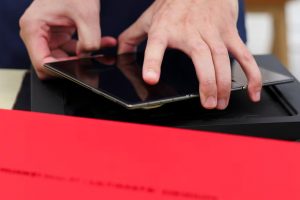A wave of patriotic of support for Huawei’s new ‘sci-fi’ tri-foldable smartphone, has been lulled by sky-high prices and slow supply.
‘Super fans’ of Huawei — impressed by the Chinese firm’s ability to overcome US sanctions and make technological progress — have been lining up to buy the $2,800 starting model of the Mate XT, but many have been forced to go back home empty-handed.
“I’ve been here since 10pm last night because this tri-folding phone is a first and I’m excited to support our country,” said a university student surnamed Ye.
Also on AF: US May Sanction China’s DRAM Chip Giants Next, Analyst Warns
But on-the-spot buyers like Ye are unable to purchase the MateXT, as the phones can only be bought by those whose pre-orders had been confirmed.
“This is very disappointing. They should have made it clear we can’t buy,” Ye told Reuters.
It was a similar story at the Huawei Wangfujing store in Beijing, where access to the much-hyped phone – which folds three ways like an accordion screen door – was restricted to those whose pre-orders had been confirmed.
The Mate XT went on sale on Friday and Reuters reported seeing around 30 people queuing outside the Huawei store in Beijing to buy the phone.
Pre-orders for the Mate XT, meanwhile, have surpassed 6.5 million — almost double the roughly 3.9 million foldable smartphones shipped worldwide in the second quarter of this year, according to consultancy IDC.
But “pre-ordering” does not require consumers to put down a deposit. Huawei did not say how many customers would receive the Mate XT on launch day or how many phones it had produced so far.
Sky-high prices
Interest in the phone has also led some to sell versions of the phone at prices as high as over $20,000.
The base model of the Mate XT is priced around $2,800. That’s more than twice the price of Apple’s newly launched iPhone 16 Pro Max — which also went on sale on Friday
But on the Alibaba-owned Xianyu platform, average price for Mate XT phones was 50,000 yuan ($7,089).
There were around 4,760 listings for the phone on the platform – for both sale and pre-orders – as of Friday afternoon.
Meanwhile, in the Huaqiangbei electronics market in Shenzhen, a phone stall vendor said she was selling the most expensive version of the Mate XT – with the highest memory – for 150,000 yuan ($21,290), compared to the store price of 23,999 yuan.
She was also offering the $2,800 model for more than $4,000.
Asked if she had sold any, she replied: “A few people have asked, but it’s far too expensive.”
At Huawei’s flagship store in Shanghai, the firm’s executive director Richard Yu said that sales were “better than expected”, without providing details. The phone was sold out in “seconds” and Huawei was working to expand capacity, he added.
Lingering supply chain issues
At Mate XT’s unveiling this month, Yu said Huawei had turned “science fiction into reality”.

The launch was the second breakthrough in a year for a company left decimated by sanctions US imposed in 2019.
That fact was not lost on Huawei’s Chinese customers.
“Chinese people need to support (Huawei). Our Huawei phones currently lag behind in terms of technology and chips, but it’s this gap that calls for our support,” said Jiang, a 60-year-old business owner in Beijing.
Huawei’s supply chain issues are also far from resolved.
Based on recent checks, key components of the Huawei Mate XT, including the panel, cover glass, and hinges, may be facing production yield issues, said Lori Chang, a senior analyst with Isaiah Research.
Even so, Huawei is exploring launching the Mate XT in overseas markets in the first quarter of next year, a person with knowledge of the matter said.
Not all impressed
Despite its many challenges, Huawei has emerged as a key competitor to Apple in China, where new iPhone launches once sparked a frenzy.
The patriotic wave has carried Huawei to grab the third-largest market-share in China — the world’s biggest smartphone market.
Apple’s sales have dwindled, meanwhile, even as the firm offered rare discounts. In the second-quarter of the year, the US phone-maker dropped from third to sixth place in the Chinese market.
Apple’s latest launch has also been overshadowed by the fact that it has yet to announce an AI partner in China. That mean Apple Intelligence, its AI software, will only be available in Chinese next year.
But some Chinese Apple fans said the AI challenge was not an issue.
“The lack of AI in iPhones is not currently a major concern for me, as it’s more of a gimmick at this stage,” said a customer surnamed Shi who upgrades his iPhone annually.
Speaking about the new offering by Huawei, meanwhile, he said it was too expensive and “not for ordinary customers”.
Shi was not the only Chinese consumer not enamoured by Huawei.
One customer Rui, who got to try the Mate XT in Shenzhen, said: “I wanted to see what the fuss is about, but it’s a bit big, not very practical really.”
- Reuters, with additional editing by Vishakha Saxena
Also read:
Huawei Looks to Steal Apple’s Tech Crown With Tri-Fold Phone
Huawei Mania Heads Beyond China as it Steps up Marketing Blitz
US Targets China’s Top Chip Plant Over Huawei Mate 60 Pro Coup
New Huawei Phone Made With ‘50% More Homegrown Chip Parts’
China Orders Apple to Cut WhatsApp, Threads from App Store
Apple Facing Rough Year in China
Huawei’s China-Made 7nm Chip ‘Years Behind US’, Raimondo Says
Huawei Profits Jump 144% in Fastest Growth Since US Sanctions
China’s Ban on iPhone Use Expands to Local and State Entities
Huawei, SMIC Set to Defy US Sanctions With 5nm Chips: FT
Huawei’s HarmonyOS Set to Overtake Apple iOS in China – Fortune
























